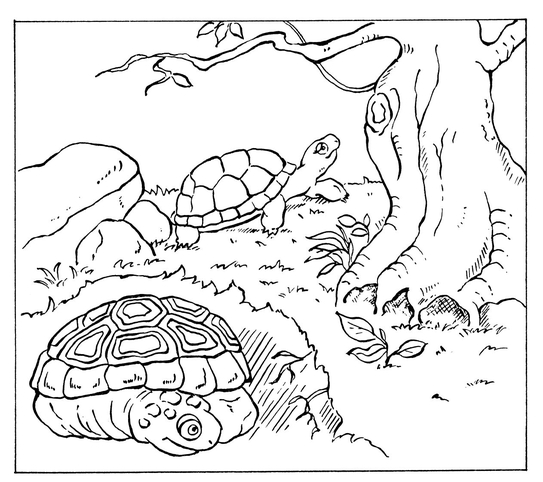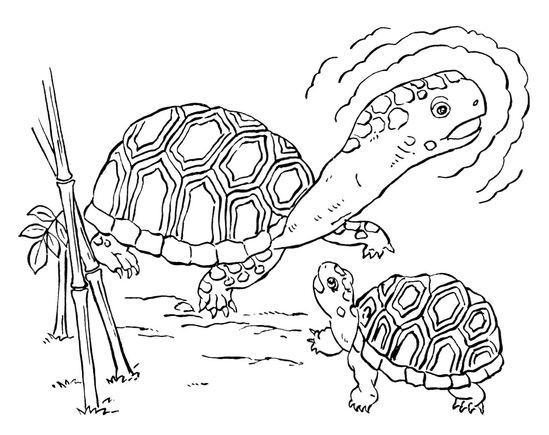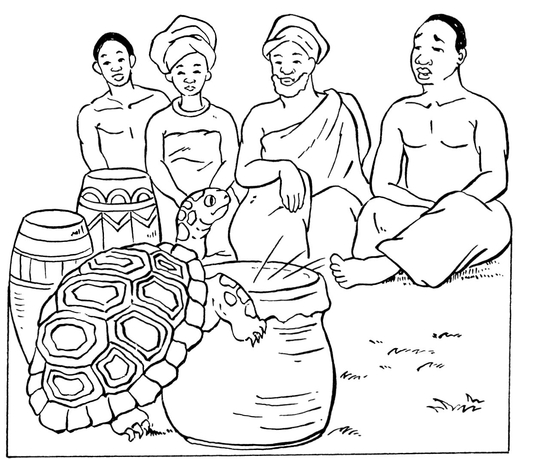African Folk Tales (2 page)
Read African Folk Tales Online
Authors: Hugh Vernon-Jackson,Yuko Green
O
NCE UPON A TIME there lived on a hill an old and selfish tortoise. He was also a cunning tortoise.
This old, selfish, and cunning tortoise had a wife who knew how to cook delicious food and how to make very good soup.
The tortoise and his wife had a large compound. In it they kept dogs, cats, goats, hens, and ducks. Some belonged to the tortoise, and some belonged to his wife.
Now as well as being old, selfish, and cunning, the tortoise was also greedy. One by one he killed and ate all his share of the dogs, cats, goats, hens, and ducks. His wife cooked this food for him but he gave her very little of it to eat, for he wanted to eat as much as he could by himself. The tortoise's wife did not mind. “It is the way of my husband's character,” she thought, “and I am used to it.”
After the tortoise had eaten his share, he said that he would like to start eating the dogs, cats, goats, hens, and ducks which belonged to his wife.
“No,” said his wife. “I will not let you eat my animals.” She would not listen to his begging. “Nor will I let you eat my hens and my ducks,” she said.
The tortoise planned to deceive his wife and by trickery to obtain what he wanted. He pretended to be very ill.
“Go quickly and pray,” the tortoise told his wife, “and ask how I can be cured.”
As soon as his wife had gone into the woods to pray, the tortoise left the mat on which he had been lying, and by another path went to the place where he knew his wife would pray. He hid himself in a hole and waited for his wife to come. When she arrived, the tortoise heard her ask how she could cure her husband's illness.

“No one can help your husband,” the tortoise replied from his hole, “but you yourself. ”
“No one can help your husband,” the tortoise replied from his hole, speaking in a strange, deep voice, “but you yourself.”
His wife prayed again, asking how she could help him.
“Unless you give your husband your fattest goats and fattest animals, and also your fattest hens and ducks,” the tortoise answered, “your husband is sure to die.”
The wife was very grateful for an answer to her prayer and she hurried off on her way home.
As soon as she had gone the tortoise crawled out of the hole and ran as fast as he could by a short path and reached his house before his wife returned. There he lay down again on his mat and pretended still to be sick.
When his wife came back, she told the tortoise what she would do to help him.
“It is good news,” said the tortoise. “Now bring me your fattest goats and fattest animals, and also your fattest hens and ducks.”
When the wife brought her fattest animals and birds, the tortoise took them off into the woods. He told his wife not to follow, and he walked slowly like a sick man until he was out of sight of his wife. Then he ran very fast.
When the tortoise reached a small farm which he had in the middle of the woods, he killed all the fat animals as well as the fat hens and fat ducks. He cut them into small pieces and put them into a large black pot which he kept at his farm. He built a fire between three large stones and then put the pot of meat on top.
As the meat was cooking the smell became very sweet. The tortoise thought, “I shall enjoy eating this meat very much.”
The tortoise then went away from the fire to look for crickets in their holes, because he wanted to eat crickets together with all his meat. While he was looking for the crickets a large and ugly creature all covered with long hair crawled out of one of the cricket holes.
“I smell your food cooking,” said the ugly creature. “Carry me to where your food is cooking, tortoise.”
The tortoise refused.
“Greedy tortoise,” the creature cried angrily and said some magic words. At once, the tortoise's mouth and nose began to close. “Unless you do what I say,” said the creature, “your mouth and nose will never open again.”
The tortoise led the creature to where his meat was cooking. His mouth and nose opened, but not until the creature had eaten all the meat, every piece of it, and the tortoise was left with nothing.
“Now take me to your house,” the creature said.
The tortoise took the ugly, hairy creature back to his house, and all the people were frightened of it. It lay down in the tortoise's room and went to sleep. While the creature slept the tortoise and his wife set fire to the room and burnt it down.
When the fire had burnt itself out, the tortoise looked inside the room. There were blackened ruins. The creature was inside, well roasted and smelling like very good-tasting food.
“I shall eat the roasted creature,” the greedy tortoise said.
His wife advised him not to, but he ignored her.
When he had finished eating the creature, the head of the tortoise began to grow larger and larger. If the walls of his burnt room had not crumbled, the tortoise would not have been able to get out because his head became larger than the little doorway.

The head of the tortoise began to grow larger and larger.
Now the cunning tortoise planned a way by which he could exchange his big head for a small one. He saw a ram on his way to the river to take a bath. At that time rams had very small heads. The tortoise followed the ram.
“I too shall have a bath in the river,” said the tortoise to the ram.
“Very well,” the ram replied.
In those days it was the custom for animals to take off their heads and leave them on the river-bank before entering the water. The ram and the tortoise took off their heads. While the ram was bathing the tortoise quietly climbed out of the river; he fitted the ram's small head to his neck and very quickly ran away.
When the tortoise reached home, he and his wife put their belongings in baskets and ran away from the hill on which they lived. They went to a faraway valley.
“We shall build our new house here,” said the tortoise, and they did.
Meanwhile, the ram had finished his bath, but on leaving the river found that his head had been taken away. Angry as he was, he had to have a head, so he put on the big one which the tortoise had left.
The ram ran to where the tortoise had once lived.
“Where is that cunning tortoise?” the ram cried, but no one knew where the tortoise and his wife had gone.
Promising himself that one day he would find and punish the tortoise, the ram went away. But he never found the tortoise and he had to keep his big head. That is why the ram's head is big and the tortoise's head is small: it is an exchange of heads.
O
NCE UPON A TIME a she-goat told her children that they would go out into the world to seek their fortune.
They set out and reached a cave when night came. When they entered the cave in order to find shelter for the night, they met a hyena inside.
“Welcome to you,” said the hyena. “I will give you food and water.”
The she-goat thanked the hyena.
“I will go to fetch water for you,” said the hyena.
The she-goat thanked the hyena again, but said that she and her children had decided not to drink.
“I will grind corn for you,” said the hyena. The she-goat thanked the hyena, but said she would grind it herself.
The she-goat started to grind corn on a stone and as she worked she sang a song.
“My teeth are blunt,” she sang, “and my mouth is tired, because I have been eating elephant and lion today.
Hyena, I come to you.
What would you have me do to you?”
When the hyena heard this song, she ran out of the cave and into the bush. Then the she-goat said to her children, “If I had not played this trick, the hyena would have killed us.”
After eating their meal, the she-goat and her children lay down on the floor of the cave and went to sleep.
The next morning they got up and travelled all day along the road until night came. Again they found a cave and entered it in order to shelter for the night. But inside the cave there was a lioness.
When the lioness saw the she-goat and her children, she roared; she roared because she thought she would kill the she-goat and her children.
Then the she-goat started to sing.
“My teeth are blunt,” she sang, “and my mouth is tired, because I have been eating elephant and lion today.
Lioness, I come to you.
What would you have me do to you?”
The children of the she-goat also started to sing.
“To be able to fight,” they sang,
“To fight is our great delight.
We made the hyena run from us yesterday.”
When the lioness heard this, she ran out of the cave and into the bush. Then the she-goat and her children ate the food of the lioness.
“We should thank ourselves,” said the she-goat, “for playing this trick. Otherwise the lioness would have killed us.”
They lay down on the floor of the cave and went to sleep.
The next morning they got up and travelled all day along the road until night came, when they reached a certain town where all the women were wicked. They entered the compound of the oldest, most wicked woman in the town.
“Welcome,” said the wicked old woman, “and spend the night in my house. I will give you food to eat and water to drink.”
The she-goat and her children thanked the wicked old woman and entered her compound.
“Here is guinea corn and here is a grinding stone,” said the wicked old woman. “You must grind the corn so that you will have food to eat.”
Then the she-goat started to sing.
“My teeth are blunt,” she sang, “and my mouth is tired, because I have been eating elephant and lion today.
Wicked old woman, I come to you.
What would you have me do to you?”
The children of the she-goat also started to sing.
“To be able to fight,
To fight is our great delight.
We made the lioness run from us yesterday.”
When the wicked old woman heard this she went everywhere in the town saying that the she-goat and her children had eaten elephant and lion and had made the lioness run away. Then the wicked old woman and all the people heard the she-goat and her children sing another song:
“Run away, run away,” they sang.
“It is men and wicked women,
We shall eat today.”
The people of the town became very frightened. Then, seizing their belongings, they left the town and scattered. They left the town to the she-goat and her children.
The she-goat said to her children, “If we had not played this trick, the wicked old woman would have killed us; she would have eaten our meat and made our skins into mats for the floor of her compound.”
Then the she-goat and her children went to live in the deserted town, and ate the food that was there. They made their homes there, because they had succeeded in their cleverness.
L
ONG AGO there was a man called Yusufu who had a wife named Lade. They had only one son and his name was Hanafi. Because he was their only son, Hanafi was very much loved by his father and mother. His parents, in fact, always gave him everything he wanted and allowed him to do anything he pleased.
As Hanafi grew older he became very fond of hunting. One evening he told his parents that he planned to go hunting that night.
“Please do not go tonight,” his mother Lade said. “I feel that tonight is unlucky.”
“It is very dangerous,” said his father Yusufu. “You are our only son, and we do not want you to risk death in the forest at night.”
Hanafi refused to pay any attention to what his father and mother said. Finally they allowed him to go.
Hanafi went into the forest with several friends. They took bows and arrows, knives and guns and also lamps. When the animals came to the light the hunters killed two deer and six hares, and Hanafi was given his share of the meat.
As the hunters started back to their village, there was thunder and lightning in the sky. There was a great wind, and then there was heavy rain.
Hanafi saw a tortoise sitting in its house.
“Please may I have shelter from the rain?” Hanafi asked the tortoise.
“You may indeed have shelter,” the cunning tortoise replied. “Here is a big pot you may sit in.”
It was dry in the pot, so he thanked the tortoise and crawled inside.
As soon as Hanafi had entered the pot the tortoise took a large piece of skin and covered the mouth of the pot with it. With the skin tied on top the tortoise made the pot into a drum.
The next day the tortoise went to the king of the village.
“Your Majesty,” the tortoise begged as he knelt on the floor in front of where the king was sitting, “may we have a drumming competition?”
“A drumming competition is a good idea,” said the king. “We shall see who in the village makes his drum sound the best.”
Three days later everyone in the village assembled at the palace, and all the skilled drummers also came. With them they brought their drums.

As the tortoise beat the drum, Hanafi, the boy inside, began to sing.
Yusufu, the father of the boy in the tortoise's drum, was amongst the crowd which came to the palace. As the tortoise beat the drum, Hanafi, the boy inside, began to sing. Yusufu heard the voice; he heard the boy singing his own and his father's names.
After the drumming was over, the king praised the tortoise, saying that the sound of his drumming was better than anyone else's. Then Yusufu went to the tortoise.
“Come to my house, tortoise, chief of all drummers,” he said, “and you will be given an excellent dinner.”
The tortoise thanked Yusufu and followed him to his house at the edge of the village.
While much good food and drink was being given to the tortoise, Yusufu told his wife to boii water. After his meal the tortoise lay down on a mat and went to sleep.
“Quick!” whispered Yusufu to his wife, “we will make him into soup,” and they put the tortoise in the boiling water.
“Quick!” cried Yusufu to his wife, “we must save our son Hanafi.”
He cut the skin on the tortoise's drum and brought out his son in time to save his life.
Ever after, Hanafi was an obedient boy who lived happily because he followed the advice of his father and mother.